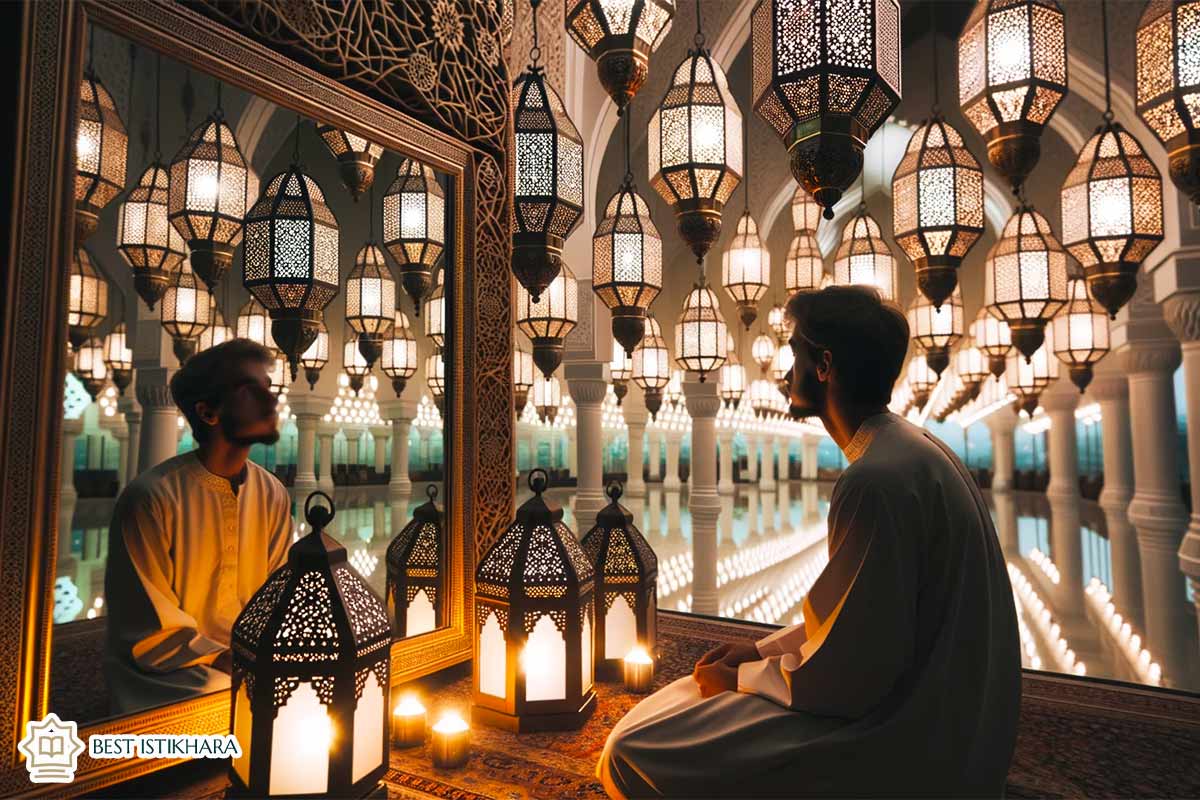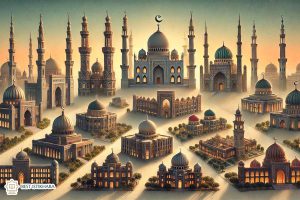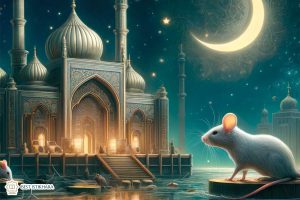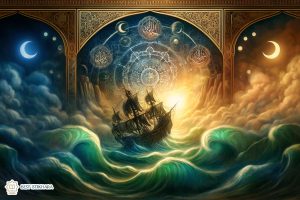In Islamic tradition, dreams hold a significant place, serving as a window into the unseen world and offering insights into one’s spiritual journey. They are viewed as messages from the divine, guiding individuals through various aspects of their lives. One particularly intriguing dream motif is that of seeing one’s face in a mirror. This symbolic imagery has captivated scholars and believers alike, prompting profound interpretations rooted in Islamic teachings and beliefs. This article delves into the layers of meaning associated with such a dream, weaving together scriptural references, prophetic traditions, and insights from renowned Islamic dream interpreters. By understanding the implications of this dream, one can gain a deeper appreciation for the intricate tapestry of symbols that Islam offers to its followers. Join us as we embark on a journey of reflection, seeking to unravel the mysteries behind seeing one’s face in a mirror in the realm of dreams. If you want to read more about this topic, follow the dream interpretation in Islam.
Meaning of Seeing One’s Face in a Mirror in Islamic Dream Interpretation
In Islamic dream interpretation, dreams hold significant importance, and they have been discussed in various Islamic texts. The Prophet Muhammad (peace be upon him) had said that dreams are a part of prophethood, and the interpretations of dreams are based on various sayings of the Prophet and Islamic scholars. Seeing one’s own face in a mirror in a dream can have different interpretations based on the context and the condition of the face:
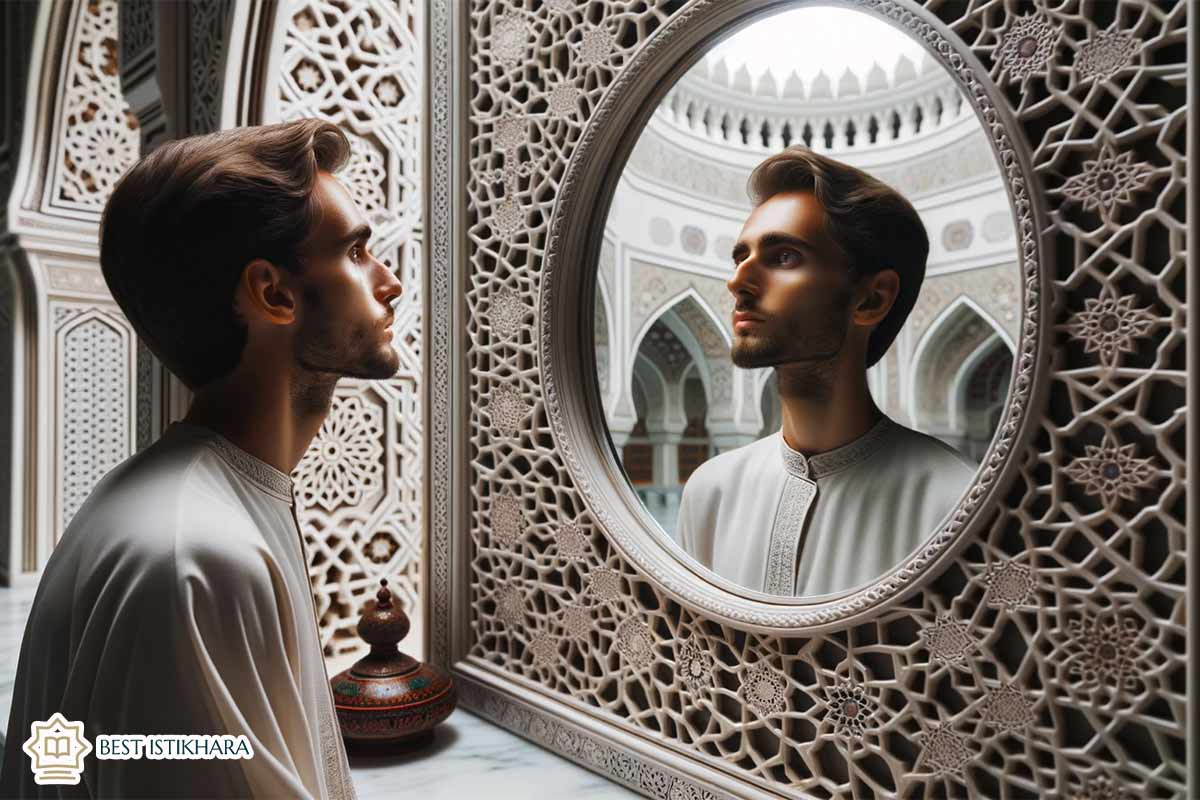
- Clear and Beautiful Face: If one sees his face clear and beautiful in the dream, it may suggest that he is on the right path, spiritually pure, or doing good deeds. A radiant face often signifies the pleasure of Allah.
- Distorted or Ugly Face: If the face appears ugly or distorted, it might indicate the person’s sins, wrongdoings, or being distant from the right path. This is a reminder for the dreamer to seek repentance and rectify his actions.
- No Reflection: Seeing a mirror without a reflection or not being able to see one’s face might indicate forgetting one’s identity, neglecting one’s duties, or being inattentive to spiritual matters.
- Changing Faces: If the face keeps changing in the dream, it might suggest instability in one’s character or being insincere in one’s actions.
- Seeing Other Faces: If in the mirror, the dreamer sees someone else’s face instead of their own, it may indicate aspects of oneself that are reflected in others or characteristics one sees in others that they might not recognize in themselves.
However, dream interpretation is a subjective field. The context, feelings, and other elements in the dream play a crucial role in its interpretation. It’s also essential to remember that not every dream carries a significant meaning. Some might just be a reflection of one’s subconscious thoughts or daily activities. When interpreting dreams, it is recommended to seek advice from knowledgeable and trusted individuals, and most importantly, not to base life decisions solely on dream interpretations.
Famous Islamic Dream Interpreter’s Views on Mirror Reflections
Islamic dream interpretation has a profound history with certain scholars and interpreters who have deeply examined and explained the meanings of various dream symbols. Some of the most notable Islamic dream interpreters include Ibn Sirin, al-Nabulsi, and Ibn Shaheen. Here’s what some of these famous interpreters have mentioned regarding mirror reflections:
- Ibn Sirin:
- One of the most renowned figures in Islamic dream interpretation, Muhammad Ibn Sirin (653–728 AD) has compiled a vast collection of dream interpretations. When it comes to seeing oneself in a mirror, Ibn Sirin has commented that it could be a representation of one’s state. A clear reflection could indicate purity, righteousness, or a clear heart. If the reflection is distorted or unclear, it might indicate confusion or internal turmoil.
- Seeing a broken mirror can be symbolic of separation or distance from loved ones, and if the mirror gets repaired or replaced, it can suggest a reunion or reconnection.
- Al-Nabulsi:
- Abd al-Ghani al-Nabulsi (1641–1731 AD) is another esteemed figure in the realm of Islamic dream interpretation. He has discussed mirrors in the context of self-reflection and one’s state of the heart and soul. Seeing oneself clearly in the mirror might signify self-awareness and clarity in one’s spiritual journey, whereas an unclear reflection might hint at uncertainty or internal struggles.
- If one sees themselves as more beautiful or more deformed in a mirror than in reality, al-Nabulsi interprets this as the person’s state in the eyes of God, with beauty indicating righteousness and deformity indicating sins.
- Ibn Shaheen:
- Ibn Shaheen’s interpretations often align with other scholars but can sometimes offer different insights. He suggests that mirrors in dreams might be a reflection of the dreamer’s internal state, and how they truly see themselves, or how they feel they are perceived by others.
- He also believes that the condition of the mirror and the dreamer’s feelings when looking into it play a crucial role in its interpretation.
It’s essential to understand that these interpretations, while rooted in Islamic traditions and teachings, can be subjective. The broader context of the dream, the individual’s personal experiences, and emotions felt during the dream all play a pivotal role in its true meaning. It’s often advised not to rely solely on dream interpretations for major life decisions and to approach them with an open mind.
Quranic Verses Related to Dream Interpretation and Mirrors
The Quran, which is the holy book of Islam, contains numerous verses (ayat) that touch on various aspects of life, faith, and the universe. However, when it comes to dream interpretation and mirrors specifically, the Quran does not delve into detailed explanations like those found in Hadith or other Islamic literature.
-
Dream Interpretation:
- Joseph’s Dream (Surah Yusuf, 12:4): One of the most notable mentions of dreams in the Quran is the story of Prophet Yusuf (Joseph). He relates his dream to his father, saying, “O my father, indeed I have seen [in a dream] eleven stars and the sun and the moon; I saw them prostrating to me.”
- Interpretation of the King’s Dream (Surah Yusuf, 12:36-49): Later in the same surah, two men in the prison have dreams, and Yusuf interprets them. Following that, the king has a dream about seven fat cows being eaten by seven lean cows, and seven green spikes of grain and others that were dry. Yusuf gives the interpretation of this dream as well.
-
Mirrors:
- The Quran does not explicitly mention mirrors in the context we know them today. However, there are verses that metaphorically speak about things being reflections or clarifications, but not directly referring to mirrors as objects of reflection.
- One such example can be found in Surah Al-Baqarah (2:266) which speaks of a parable. While it doesn’t refer to a mirror, it uses the concept of seeing clearly: “Would any of you wish to have a garden with date-palms and vines, with rivers flowing underneath, and all kinds of fruits for him while he is stricken with old age, and his children are weak (not able to look after themselves), then it is struck with a fiery whirlwind, so that it is burnt? Thus Allah makes clear His Ayat (proofs, evidences, verses) to you that you may give thought.”
While the Quran provides guidance on a wide array of subjects, for detailed dream interpretations or specific symbolic meanings of objects like mirrors, scholars and believers often turn to the Hadith (sayings of the Prophet Muhammad, peace be upon him) or the works of Islamic scholars who have studied dream interpretations in depth.
Is Seeing Your Face in a Mirror in a Dream a Good or Bad Sign in Islam?
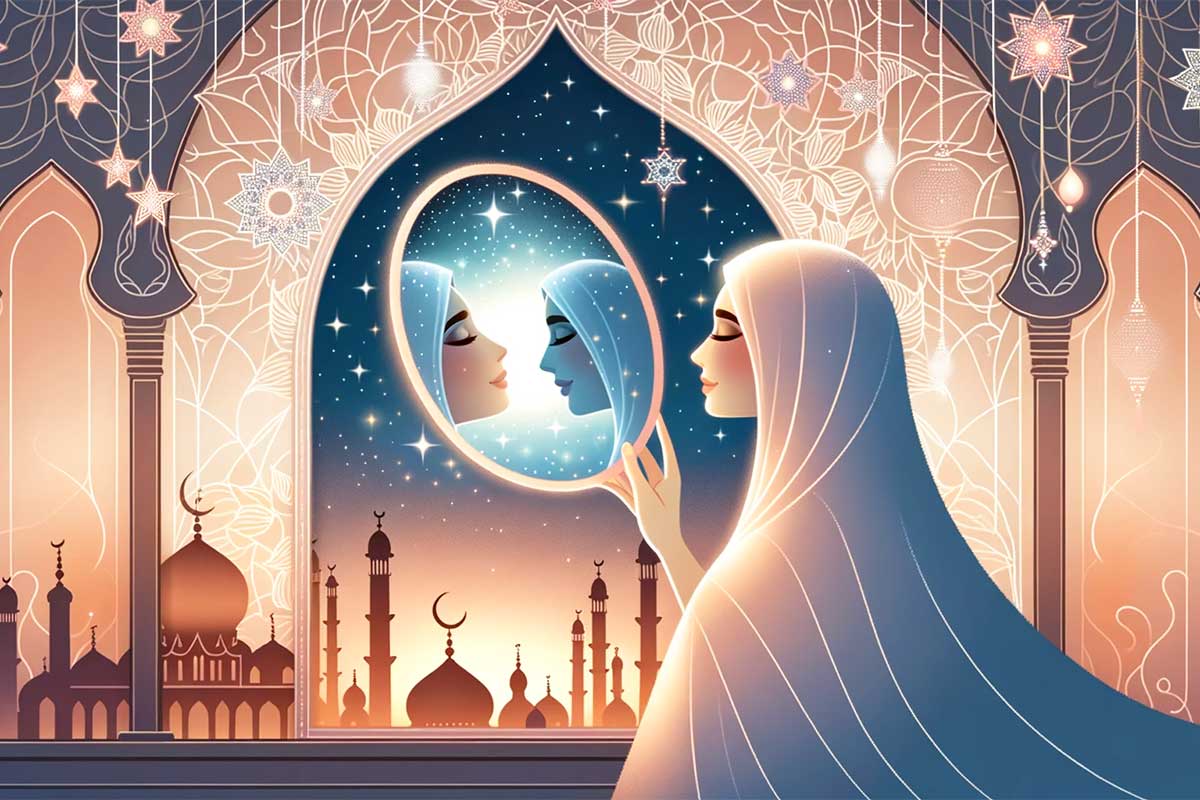
In Islamic dream interpretation, dreams can be categorized into three types, as mentioned in the Hadith:
- True dreams or glad tidings from Allah.
- Disturbing dreams from Satan.
- Dreams that arise from one’s own thoughts or experiences.
Seeing one’s own face in a mirror in a dream can have various interpretations depending on the condition of the reflection:
- Clear and Beautiful Face: If one sees his face clear, radiant, or beautiful in the dream, it might be interpreted as a good sign, suggesting that the dreamer is on the right path, spiritually pure, or doing good deeds. A radiant face often signifies the pleasure of Allah and can be considered a good sign.
- Distorted or Ugly Face: If the face appears ugly, distorted, or different from the normal appearance, it might be taken as a cautionary sign. This could indicate the person’s mistakes, sins, or being distant from the right path. It acts as a reminder for the dreamer to introspect, seek repentance, and rectify their actions.
- Other Features: Other features, like seeing a spot on the face, might be related to specific sins or shortcomings. The overall emotional feeling in the dream, such as fear, happiness, or sadness, also plays a significant role in its interpretation.
However, it’s crucial to approach dream interpretations with caution. While they can provide insights or guidance, they are subjective and influenced by various factors, including one’s personal experiences and emotions. Not every dream has a significant or direct meaning, and sometimes they’re just reflections of our subconscious.
If someone is concerned about a dream they had, it’s recommended to:
- Seek refuge with Allah from the evil of the dream.
- Change the side on which they were sleeping.
- Avoid sharing distressing dreams with others.
- Consult knowledgeable individuals or scholars about the dream if they feel the need for interpretation.
Remember, while dreams can provide insights, they should not be the sole basis for major life decisions. It’s essential to rely on one’s understanding, prayers, and seek guidance from knowledgeable individuals when needed.
Conclusion
In the realm of Islamic dream interpretation, seeing one’s face in a mirror carries significance that transcends mere reflection. This dream symbolizes a spiritual mirror, reflecting the state of one’s soul and deeds. A clear, beautiful face often signifies righteousness and Allah’s pleasure, while a distorted or ugly reflection may serve as a warning to rectify one’s actions and seek repentance. However, dream interpretation remains subjective and context-dependent. While it offers guidance and self-reflection, it should not dictate life decisions. Approach dreams with a discerning mind, understanding that they are but one facet of the complex human psyche.

